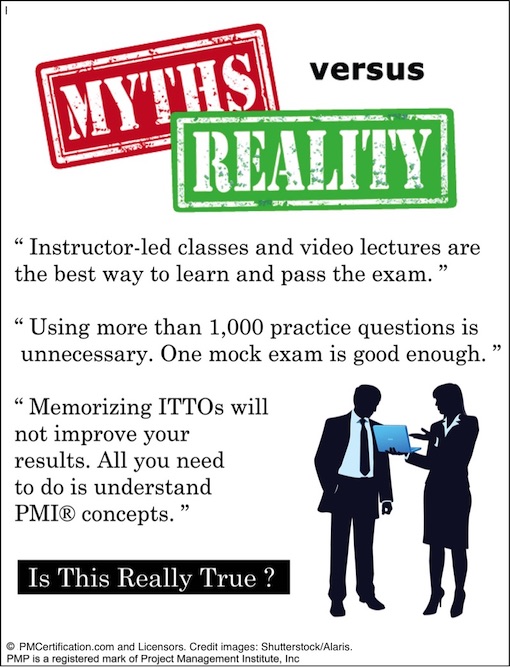Let’s have a quick look at some common myths and realities surrounding the development of an effective study strategy. Take a look at the next figure to discover some of these “myths”. What do you think about them?
What is the best studying strategy to be successful in your PMP® exam? How much more knowledge do you need to absorb? Is a classroom setting with little room for personalized instruction an optimal way to assess and improve on your weak areas? Which process domain, knowledge area or RDS task seems to give you the most trouble? How many questions can you realistically expect in these areas?
As you will discover, it is important to study all project management topics covered on the exam. However, it is not necessary to develop advanced expertise in any one specific area. For example, it is a misconception to think that you must be a wizard at earned value or critical path calculations. In reality, you only need to be able to apply basic methods and formulas. Why is this? Because the exam is testing your skills in so many areas there will only be a limited number of questions in each of the areas, and these questions could be easy, intermediate or difficult depending on the random set of questions that will be presented to you on exam day.
The most difficult questions are answered incorrectly by the vast majority of candidates and this is expected, which is why we recommend not spending too much time learning tricky calculations or developing a deep understanding of specific areas. A better investment in study time and effort is to focus on the areas where you are the least knowledgeable and have little experience and skills. This way, you will not only improve your chances of passing but you will also expand on your repertoire of project management skills, which will be beneficial to your career prospects.

Of utmost importance, and what you cannot afford to do is to answer easy questions incorrectly. Most easy questions involve accurate knowledge of PMBOK® Guide processes, inputs, tools and techniques, and outputs (ITTOs) and require perfect memory recall. Most students will need to memorize this information to ensure fast and exact recollection. We highly recommend that students invest the time to memorize as many ITTOs as possible. This will help you to be confident with your reasoning when answering many of the questions.
Questions that require ITTO knowledge do not necessarily present as basic definition-type questions. Several are situational and require you to decipher the ITTO from a story or a challenging question. The more confident you are with your recollection skills, the faster will be able to recognize which ITTO the question is actually testing. As you progress through this book, you will encounter numerous opportunities and techniques to develop a good level of memorization of ITTOs.
In the last phase of your exam preparation, you will need to focus on uncovering your strengths and weaknesses and work at filling the gaps. Using a large set of practice questions that provides detailed analysis of your results will be extremely helpful.
Alumni have shared with us that training with hundreds of practice exam questions was the key to their success. Also, in order to train for realistic exam conditions, many took several full 4-hour, 200-question PMP® simulated mock exams.
PMI, PMBOK, PMI talent triangle and PMP are registered trademarks of the Project Management Institute, Inc. All other trademarks are trademarks of their respective owners.
We do not endorse or recommend any particular training or services. We provide information only which we hope are helpful.
